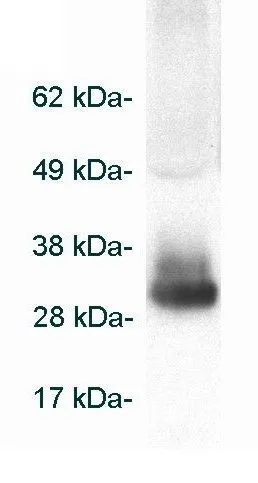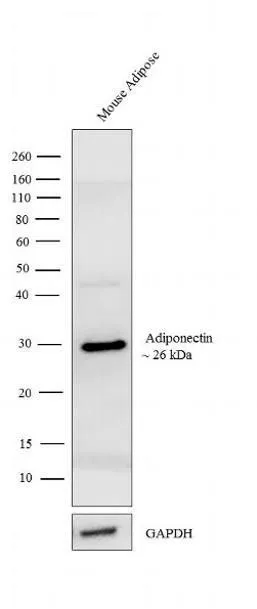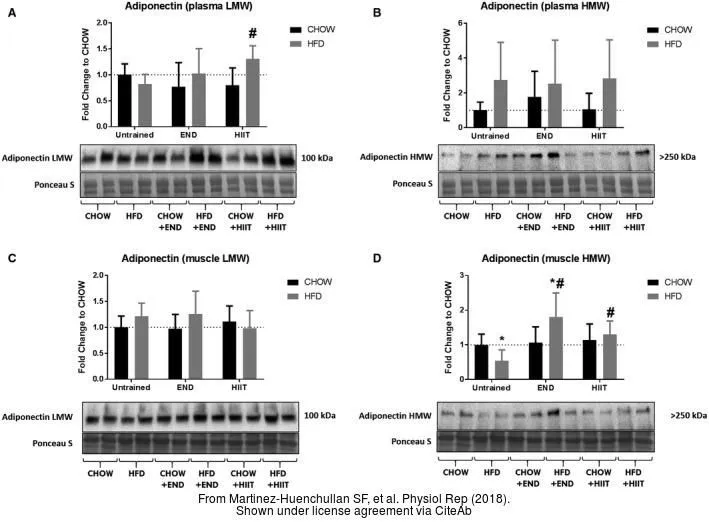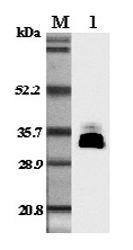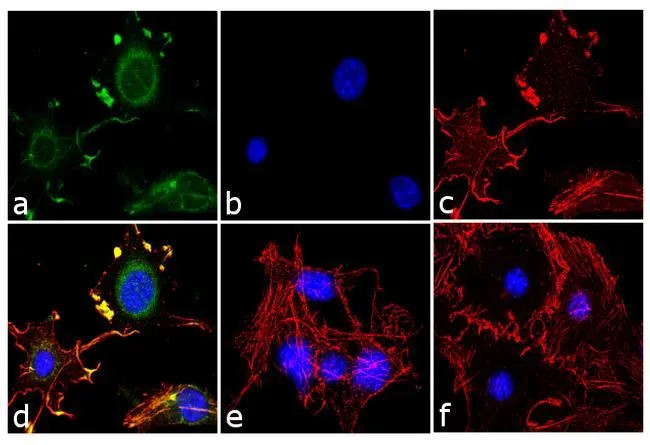
ICC/IF analysis of 3T3-L1 cells differentiated with Adipogenesis Supplement using GTX23455 Adiponectin antibody. Panel e is untreated cell with no signal. Panel f represents control cells with no primary antibody to assess background. Green : Primary antibody Blue : Nuclei Red : Actin Fixation : 4% paraformaldehyde Permeabilization : 0.1% Triton X-100 for 10 minute Dilution : 2 μg/ml in 0.1% BSA and incubated for 3 hours at room temperature
Adiponectin antibody
GTX23455
ApplicationsImmunoFluorescence, ImmunoPrecipitation, Western Blot, ImmunoCytoChemistry, ImmunoHistoChemistry, ImmunoHistoChemistry Paraffin
Product group Antibodies
ReactivityHuman, Mouse
TargetAdipoq
Overview
- SupplierGeneTex
- Product NameAdiponectin antibody
- Delivery Days Customer9
- Application Supplier NoteWB: 2 microg/ml. ICC/IF: 2 microg/ml. *Optimal dilutions/concentrations should be determined by the researcher.Not tested in other applications.
- ApplicationsImmunoFluorescence, ImmunoPrecipitation, Western Blot, ImmunoCytoChemistry, ImmunoHistoChemistry, ImmunoHistoChemistry Paraffin
- CertificationResearch Use Only
- ClonalityPolyclonal
- Concentration1 mg/ml
- ConjugateUnconjugated
- Gene ID11450
- Target nameAdipoq
- Target descriptionadiponectin, C1Q and collagen domain containing
- Target synonyms30kDa, APN, Acdc, Acrp30, Ad, Adid, GBP28, adipo, apM1, adiponectin, 30 kDa adipocyte complement-related protein, adipocyte complement related protein, adipocyte complement-related 30 kDa protein, adipocyte, C1Q and collagen domain containing, adipocyte, C1q and collagen domain-containing protein, adipocyte-specific protein AdipoQ, adiponectin d
- HostRabbit
- IsotypeIgG
- Protein IDQ60994
- Protein NameAdiponectin
- Scientific DescriptionAdipose cells produce and secrete numerous physiologically important proteins, such as lipoprotein lipase (LPL), leptin and adiponectin protein of 30 kDa. Adiponectin is a circulating protein that is secreted exclusively by differentiated adipocytes. During adipocyte differentiation, mRNA levels of Adiponectin have been shown to be induced over 100-fold. Studies indicate that Adiponectin enhances the ability of sub-physiological levels of insulin to suppress glucose production, thus linking adipose tissue to whole body glucose regulation. Adiponectin function appears to be regulated by phosphatidylinositol-3-kinase (PI3-K) since Adiponectin secretion is blocked by pharmacologic inhibitors of this kinase. mRNA levels of Adiponectin have been shown to be significantly reduced in adipose tissue of obese patients with Type 2 diabetes relative to control subjects. Structural similarities to TNFalpha suggests that Adiponectin may play a role in pathogenesis of insulin resistance in Type 2 diabetes. Because Adiponectin is down-regulated in various forms of obesity and its structural similarity to TNFalpha, it is currently being investigated as an important regulator of whole body energy homeostasis.
- ReactivityHuman, Mouse
- Storage Instruction-20°C or -80°C,2°C to 8°C
- UNSPSC41116161
References
- Genetic and Functional Effects of Adiponectin in Type 2 Diabetes Mellitus Development.Read this paper
- Skeletal muscle adiponectin induction depends on diet, muscle type/activity, and exercise modality in C57BL/6 mice. Martinez-Huenchullan SF et al., 2018 Oct, Physiol RepRead this paper
- Differential metabolic effects of constant moderate versus high intensity interval training in high-fat fed mice: possible role of muscle adiponectin. Martinez-Huenchullan SF et al., 2018 Feb, Physiol RepRead this paper
- Hypogonadism alters cecal and fecal microbiota in male mice. Harada N et al., 2016 Nov, Gut MicrobesRead this paper

